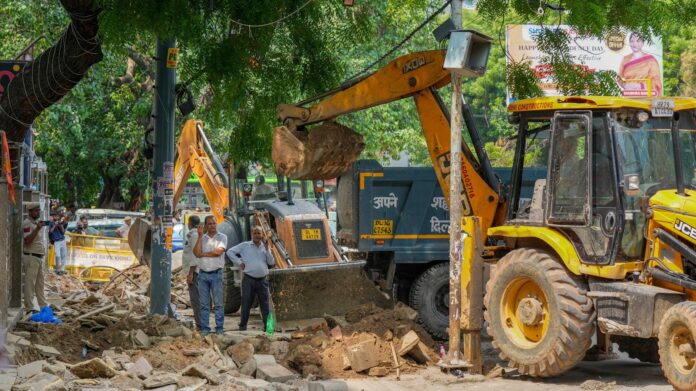Sidra Fatima, TwoCircles.net
On September 10, 2024, municipal authorities in Gujarat’s Surat district launched a demolition drive in Saiyedpura, an area recently hit by riots following an alleged stone-pelting at a Ganesh pandal. Despite official claims of a pre-planned anti-encroachment operation, the timing and scale of the demolitions of “illegal” structures — just a day after the unrest — have raised alarms. Critics argue that the actions may amount to targeted punishment, challenging the Supreme Court’s recent order in this regard.
Bulldozers moved into Saiyedpura on September 9, 2024, accompanied by a heavy police presence. The operation involved the demolition of “illegal” structures and the removal of makeshift handcarts and roadside shops. This action followed an incident on September 8, when minors allegedly threw stones at a Ganesh pandal, leading to riots and the arrest of 30 individuals, including six minors.
However, authorities deny any link between the demolitions and the unrest. Surat Municipal Corporation (SMC) officials claimed that the demolition was part of a “pre-scheduled” anti-encroachment drive “planned weeks in advance” due to the significant encroachments in Saiyedpura.
“We decided to remove the encroachments during a meeting two weeks ago. Saiyedpura is severely affected by illegal encroachment, and all four local municipal councilors had requested action,” Deputy Mayor Narendra Patil told the media.
However, the timing of the demolitions — just a day after the violence — raises questions, especially given recent Supreme Court ruling against using demolitions as collective punishment. The court has emphasised that demolitions should not be used for retribution and has asked the Centre to establish uniform guidelines for such operations nationwide.
“Officials preplanned the demolition to divert public attention from the real issues arising from excessive rainfall in Gujarat, making it appear as selective action. The most concerning aspect was the brutal treatment of individuals accused of stone-pelting,” said Dev Desai, a Gujarat-based human rights activist with ANHAD.
In light of extrajudicial demolitions in several states, especially in those ruled by the Bharatiya Janata Party (BJP), the Supreme Court said accusations alone cannot justify property demolitions. A bench led by Justice Hrishikesh Roy, with Justices Sudhanshu Dhulia and S V N Bhatti, emphasised that punitive action against properties of family members not directly involved in the alleged crime is unjustifiable.
The top court highlighted the necessity of proving alleged crimes through due legal process and warned that threats of demolitions might contravene the rule of law. These observations came while addressing a petition by a Gujarat resident, who claimed that municipal authorities threatened to demolish his family’s home following an FIR against a relative on September 1, 2024.
“The demolition was conducted without proper legal procedure or court proceedings. If the authorities claim this action was planned two weeks ago, why were affected residents not served with appropriate legal notices? This appears to be a premeditated action aimed at targeting an entire community. The stone-pelting incident is much more complex than portrayed,” said Advocate Uvesh Malik, AIMIM spokesperson in Gujarat.
“What changes if the Supreme Court rules now? People have already lost their homes and are left shelterless. A judgment cannot return their homes or prevent future occurrences unless stern actions are taken against the local authorities who carried out these demolitions. Mere condemnation will not suffice; accountability and proper punishment are necessary,” he added.
Concerns Over Treatment of Minors
The arrest of six minors for stone-pelting has raised several legal and ethical issues. There is no clarity on whether the minors are being held in a juvenile justice facility or a common jail, which would violate legal norms for underage offenders. The specific charges against the minors and the status of their cases remain uncertain. Families of the detained minors and their lawyers are reportedly considering legal petitions, including a contempt petition against the police and administration for possible Supreme Court directive violations.
“The stone-pelting incident led to three FIRs and the arrest of 27 individuals, including minors sent to juvenile justice homes. However, all those arrested were brutally beaten by the police. This misuse of authority and denial of due process is particularly distressing when minors are involved. This seems to be an attempt to target a specific community for humiliation and marginalisation,” said Mujahid Nafees, convener of the Minority Coordination Committee.
Activists point out that demolitions disproportionately impact the most vulnerable and often lack full due process. There appears to be a troubling pattern of demolitions following communal violence. Although official data on such demolitions is limited, anecdotal evidence suggests an increase following civil unrest.
“Media reports from Gujarat indicate that the minors involved were allegedly trained in madrasas over the past three months to commit such acts. This narrative gained traction due to the community’s ghettoisation, with minimal interaction between Hindus and Muslims, which exacerbates existing divides,” said Desai.
As tensions persist in Saiyedpura, all eyes are on the Surat administration to clarify its stance and actions. The developments have already prompted demands from the legal community and civil society for greater transparency and adherence to judicial guidelines, emphasising fair treatment for all citizens, regardless of their community.
The situation in Surat underscores a broader national debate on the use of demolitions as a law enforcement tool and highlights the urgent need for a clear and consistent legal framework that respects both property rights and the rule of law.


